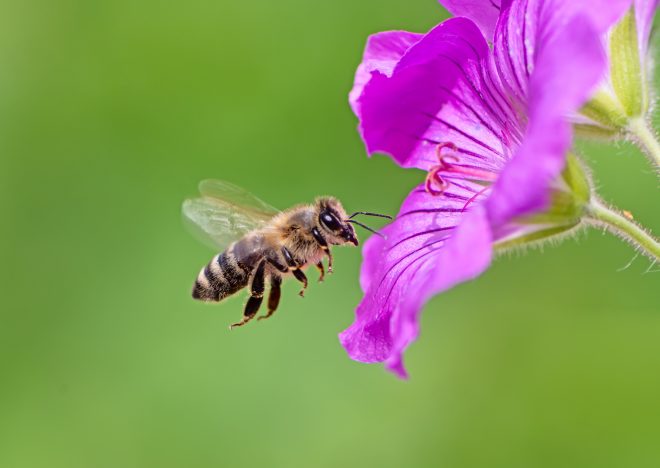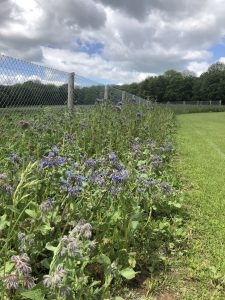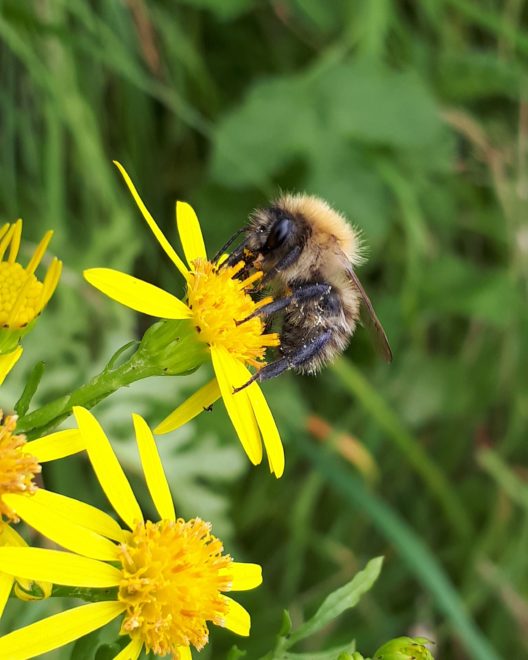Blooming marvellous! More bee havens to be created in South Downs National Park
March 11, 2022

New wildflower havens for bees and butterflies will be created after a new tranche of funding has been announced.
Grants of up to £5,000 will be available to help create new corridors of wildflowers across Sussex and Hampshire.
The South Downs National Park Trust, the official independent charity for the National Park, is now looking to hear from farmers, private landowners, parish councils, local authorities and schools with land that may be available for planting.
Expressions of interest are being invited for this second round of funding for Bee Lines – an inspiring initiative launched in 2019 to create a new network of wildflower corridors to help support bees and other pollinators. These insects have been on a steep decline across the UK for several decades and are now under threat from climate change. New planting will effectively create a “road system” for pollinating insects, allowing them to move through the landscape more easily.
Two years ago the community rallied round to raise £75,000 to smash the fundraising target and the first round of grants were awarded last year. Eight new wildflower havens will be created at the following locations:
- Prince’s Mead School, near Winchester
- Selborne Landscape Partnership
- Northchapel, near Petworth
- St Columba’s Pollinator Project, near Chanctonbury
- Sompting Wildflower Project
- Lancing College
- Truleigh Hill, near Brighton
- Lewes Cemetery
Collectively, these projects will create around 50 hectares (over 80 football pitches) of new habitat for bees.
 Wildflower planting started at Prince’s Mead School last year following a successful application in 2020. Heidi Lancaster, Head of Science, said: “Thanks to the Bee Lines grant, Prince’s Mead School now has a newly extended wildflower meadow which spans the entire length of our playing fields.
Wildflower planting started at Prince’s Mead School last year following a successful application in 2020. Heidi Lancaster, Head of Science, said: “Thanks to the Bee Lines grant, Prince’s Mead School now has a newly extended wildflower meadow which spans the entire length of our playing fields.
“The children have watched the young plants grow and with the first flowering of the meadow last year, they were amazed to see so many different bee species pollinating the flowers.
“The meadow is a fantastic outdoor learning resource for teaching our pupils about biodiversity and food chains. It’s created a valuable wildlife habitat in the school grounds linking existing hedges and wooded areas. The children are so excited when they spot tiny snails, caterpillars, bees and butterflies.
“They’ve caught glimpses of a mouse scurrying away and seen our local buzzard circling overhead. This is a long-term project which will benefit hundreds of children in the future and will help develop their understanding of the interdependence of all organisms in an ecosystem.”
 Nick Heasman, Countryside and Policy Manager for the South Downs National Park and who is leading the project, said: “Bees are incredible ‘ecosystem engineers’, quietly working away year after year to pollinate a third of food crops and 90 per cent of wild plants. But these pollinators have been in trouble for many years and Bee Lines is our way of fighting back, helping populations to recover and become more resilient to human impact and climate change.
Nick Heasman, Countryside and Policy Manager for the South Downs National Park and who is leading the project, said: “Bees are incredible ‘ecosystem engineers’, quietly working away year after year to pollinate a third of food crops and 90 per cent of wild plants. But these pollinators have been in trouble for many years and Bee Lines is our way of fighting back, helping populations to recover and become more resilient to human impact and climate change.
“We’re really excited to be launching this second round of funding applications and are looking forward to seeing the existing projects take shape. We obviously have a limited pot of funding, so will only be able to take forward a selected number of projects in this second phase.
“It’s important to recognise that these ‘Bee Lines’ will act as a network for pollinators, connecting with other wildlife corridors both inside and outside the National Park in towns and cities. People can also help by planting certain wildflowers in their gardens that will attract bees and butterflies.
“Our ultimate aim, tying in with the National Park’s ‘ReNature’ campaign, is to help make this entire region more nature-friendly.
“This is wonderful opportunity to be part of nature recovery and helping conserve our precious environment for future generations.”
 Grants of up to £5,000 will be available, subject to match funding from the applicant and a commitment to help maintain the wildflowers in future years. Applicants could also use the funding for improving existing land to benefit pollinators, for instance, through cultivation and seed mixes.
Grants of up to £5,000 will be available, subject to match funding from the applicant and a commitment to help maintain the wildflowers in future years. Applicants could also use the funding for improving existing land to benefit pollinators, for instance, through cultivation and seed mixes.
Eligible projects for Bee Lines should sit within the South Downs National Park and applications will be assessed against criteria, including habitat improvement, connectivity with other “Bee Lines” and community impact.
Expressions of interest should be submitted by midnight on 20 March.
To apply visit www.southdownstrust.org.uk/beelines/

